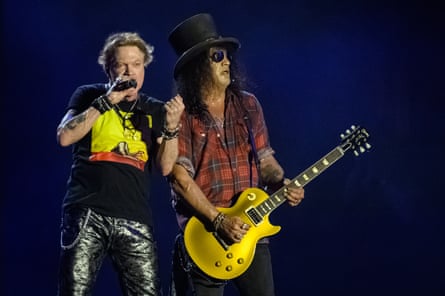
More than one-third of people over the age of 50 go to more music festivals now compared with when they were younger, a study had found.
Older music lovers in the UK have caught the so-called “festival bug”, data from Saga shows.
In a poll of 1,000 people from the over-50s services firm, 39% said they had been to a music festival or rave, and 36% said they had been to more festivals since turning 50 than in their youth.
Many of those surveyed said they favoured day festivals (38%), but 21% said they would go for the weekend or longer and camp on site. Benefits cited included discovering new music (52%), making new friends (28%) and spending time with family (27%).
Julia Smith, 50, from Essex said she and her husband had been travelling around festivals in their VW campervan for years, and next week they will be dusting off their wellies and heading to Latitude festival alongside 20 other people.
“The girlies are all going first, we’re taking vans and going a day early,” Smith said. “The men are going to join us the next day when they finish work, there is about 20 of us, all aged 50-60.”
Clive Watson, 58, first went to Glastonbury when he was 45. Since then, he said, he’s not looked back, and has attended several Glastonburys, Isle of Wight and numerous day festivals. He tends to go with friends but said at least one his children and their friends were usually in tow.
“My first festival was Glastonbury in 2011. I have now been four times and have shared special times with my grown-up son and daughter,” Watson said.
According to Lisa Edgar, the chief customer officer at Saga, the enthusiasm for festivals is part of a wider trend of over-50s challenging perceptions around being older.
“There has been a societal shift in behaviour, demographics and attitudes to ageing,” she said. “People over 50 represent a larger proportion of the population and their approach to ageing has moved to an optimistic expectation of the ‘freedom years’ in which they can travel, learn new skills, and gain new experiences – such as attending festivals.
 View image in fullscreenAxl Rose (left) and Slash of Guns N’ Roses performing at Glastonbury. Photograph: Leon Neal/Getty Images
View image in fullscreenAxl Rose (left) and Slash of Guns N’ Roses performing at Glastonbury. Photograph: Leon Neal/Getty Images
“Saga’s own research shows that this generation are healthier, wealthier, and more focused on hedonism than they have been before. As soon as they are retired they are doing a plethora of activities from fitness to culture to hobbies, six on average.”
skip past newsletter promotion
Sign up to First Edition
Free daily newsletter
Our morning email breaks down the key stories of the day, telling you what’s happening and why it matters
Enter your email address Enter your email address Sign upPrivacy Notice: Newsletters may contain info about charities, online ads, and content funded by outside parties. For more information see our Privacy Policy. We use Google reCaptcha to protect our website and the Google Privacy Policy and Terms of Service apply.
after newsletter promotion
It’s not just the attenders either: the average age of Glastonbury headliners has increased steadily in the past 15 years. Paul McCartney became the festival’s oldest ever headliner in 2022, and this year the Pyramid stage played host to more legacy superstars including Guns N’ Roses and Elton John.
The change over the past two decades is significant: in 1997, when Prodigy, Radiohead and Ash topped the bill, the average age of headliners was 26 years and five months, and by 2019 the average age was 49.
For the past 10 years, Andrew Rose has been volunteering as a medic at Glastonbury, and meeting musicians including Elton John and Dave Grohl in the process.
He said he had been backstage on the Pyramid stage many times, and he and his wife now think of Glastonbury as a holiday, and especially love seeing the bands they liked when they were younger.
“I think it’s important to give back, which is why I do it,” he said of his volunteering.

